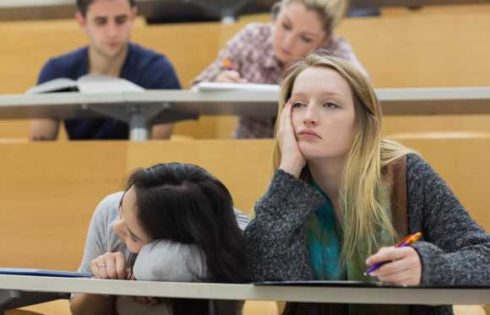 For the last couple of days, controversy has been buzzing about a YouTube video (now with more than 1.3 million views) from a college student at the University of California, Los Angeles (UCLA), who chose to take to the Internet to complain about the behavior of Asian students in the UCLA library and elsewhere. The student, who has been identified as Alexandra Wallace, claims that the “hordes” of Asian students at UCLA (UCLA’s undergraduate population is about 37 percent Asian and Pacific Islander) cause various annoyances like loudly talking on their cell phones in the library and having their extended families come over and do their chores for them.
For the last couple of days, controversy has been buzzing about a YouTube video (now with more than 1.3 million views) from a college student at the University of California, Los Angeles (UCLA), who chose to take to the Internet to complain about the behavior of Asian students in the UCLA library and elsewhere. The student, who has been identified as Alexandra Wallace, claims that the “hordes” of Asian students at UCLA (UCLA’s undergraduate population is about 37 percent Asian and Pacific Islander) cause various annoyances like loudly talking on their cell phones in the library and having their extended families come over and do their chores for them.
If you watch the video, it is easy to see why Asian students in particular, and others as well, might find it offensive—although in my opinion it is really pretty tame, as far as Internet rants go. The uproar it has caused at UCLA, however, is remarkable, and unfortunately displays the common impulse of college students and administrators to turn to official power to silence unpopular or controversial expression rather than relying on informal social sanction. It also displays the unfortunate tendency of many college students to ask for official punishment for those who air views they don’t like, or worse, to make threats—even death threats—against such people.
Let’s first deal with the administrative response.
The old saying is that when all you have is a hammer, everything looks like a nail. Just about every university’s “hammer” of choice when it comes to unpopular expression is the set of rules prohibiting harassment on campus. Indeed, Robert Naples, UCLA’s associate vice chancellor and dean of students, wasted little time in telling the Daily Bruin, UCLA’s student newspaper, that “We’ll be taking a look at the language that she uses in the video to see if it violates any codes under the student code, perhaps regarding harassment.”
That should be a short investigation. In order for something to qualify as peer-on-peer harassment on a college campus, it has to be (among other things) action that is “so severe, pervasive, and objectively offensive, and that so undermines and detracts from the victims’ educational experience, that the victim-students are effectively denied equal access to an institution’s resources and opportunities.” Davis v. Monroe County Board of Education, 526 U.S. 629, 652 (1999).
There is simply no way that this video meets that definition. What is said in the video is not particularly severe, as she couches her language in a number of ways and even apologizes at the beginning for not being “politically correct.” It wasn’t pervasive, either; the video appears to have been originally intended for the amusement of Wallace’s friends and only became widespread after the controversy began and it was reposted by others. It’s also easy to avoid seeing the video—simply by not searching for it on YouTube or clicking on links to it. Whether or not it is “objectively offensive” is a matter for debate, but at that point it doesn’t matter; in order to be harassment, the video must meet all of these criteria. It does not. Anyone minimally qualified in the law should see that very quickly; if UCLA does not, chances are it is because the university is more interested in finding a way to punish the student for her speech than in fairly conducting an investigation.
UCLA Chancellor Gene Block has also weighed in with a YouTube video of his own accompanied by a statement posted on the website of the UCLA press office. Block strongly condemns the video, which is his right to do. But his statement that “I recoil when someone invokes the right of free expression to demean other individuals or groups” is a bit mystifying, as Wallace did not “invoke” her rights in the video. Perhaps he just misused the word “invoke,” or perhaps he is responding to someone other than Wallace. Either way, it’s disappointing that Block has chosen to blame free speech here. Block continues by calling the video thoughtless, hurtful, demeaning, hurtful (again), shameful, intolerant, indefensible, hateful, and ignorant, all in the course of a short three-paragraph e-mail. It may or may not be all of those things, and again, Block certainly has the right to express his own opinions of the video, and to answer what he perceives to be as objectionable speech with speech of his own. But I know that if I were Wallace and were potentially facing a disciplinary hearing for the video, I would not feel very optimistic about getting a fair hearing about it.
Some students have also reacted in ways that aren’t particularly encouraging. A Facebook note purportedly from the Asian Pacific Coalition at UCLA asserted that “it is clear that this student’s comments can be considered a [sic] hate speech, an act of discrimination, harassment, and profiling,” and called for “disciplinary measures befitting of Wallace’s violation against the UCLA Student Code of Conduct and UCLA’s Principle of Community.” This significantly overstates the case. As discussed above, the video does not meet the legal definition of harassment by which UCLA, as a public university, is bound. It’s also worth noting that while people are free to label whatever expression they dislike as “hate speech,” the “hatefulness” of speech does not provide a legal justification for removing its Constitutional protection. Further, labeling a video like this as an “act of discrimination” dangerously confuses expression with action and, perhaps worse, is demeaning to those who suffer from real acts of discrimination. And even if UCLA did determine that the video violated some UCLA code or standard, the fact is that the expression in the video is constitutionally protected and UCLA is not free to punish Wallace for it.
Then, of course, there are the death threats against Wallace that have kept her from taking her exams at their scheduled locations and times. She also has apparently shut down her phone number and Facebook page, as her contact information was being posted around the Internet by those angry about the video. Obviously, death threats, if credible, are not protected speech and should be investigated. (Wallace is reportedly consulting with the police about them.) While UCLA Vice Chancellor Naples’ statement that “If she’s received a death threat, I find that as deplorable as her original YouTube video,” is welcome insofar as UCLA is willing to condemn death threats, it seriously raises the question of how Naples could believe that Wallace’s video, as offensive as it might be, could be anywhere near as deplorable as credibly threatening to kill someone.
One of the common complaints about FIRE is that we don’t offer specific remedies for those who have been offended by others’ speech. This is only true if you believe that official institutional or governmental punishment is the only remedy available to those who are offended. What has happened in this case proves that social pressure is an extremely strong force as well. Wallace has apologized for the video, saying,
Clearly the original video posted by me was inappropriate. I cannot explain what possessed me to approach the subject as I did, and if I could undo it, I would. I’d like to offer my apology to the entire UCLA campus. For those who cannot find it within them to accept my apology, I understand.
Wallace has been criticized by thousands on the Internet. The chancellor of her university has condemned her in the strongest terms. At this point, she is undoubtedly something of a social pariah, and she seems to have gone “off the grid” at UCLA. You have to imagine that this will affect her career prospects. And all of this has happened without any official punishment—so far, anyway.
Is official punishment really going to do much more at this point? Does anyone really believe she will express these opinions again, if she even continues to hold them? The fact that in a free society it is not the government’s place to punish people for their protected expression does not mean that people are not held accountable for it, especially in the Internet age. We would be well advised to remember that fact before we call for official punishment for those who offend us.
Robert Shibley is the senior vice president of the Foundation for Individual Rights.
Like The College Fix on Facebook / Follow us on Twitter




Please join the conversation about our stories on Facebook, Twitter, Instagram, Reddit, MeWe, Rumble, Gab, Minds and Gettr.